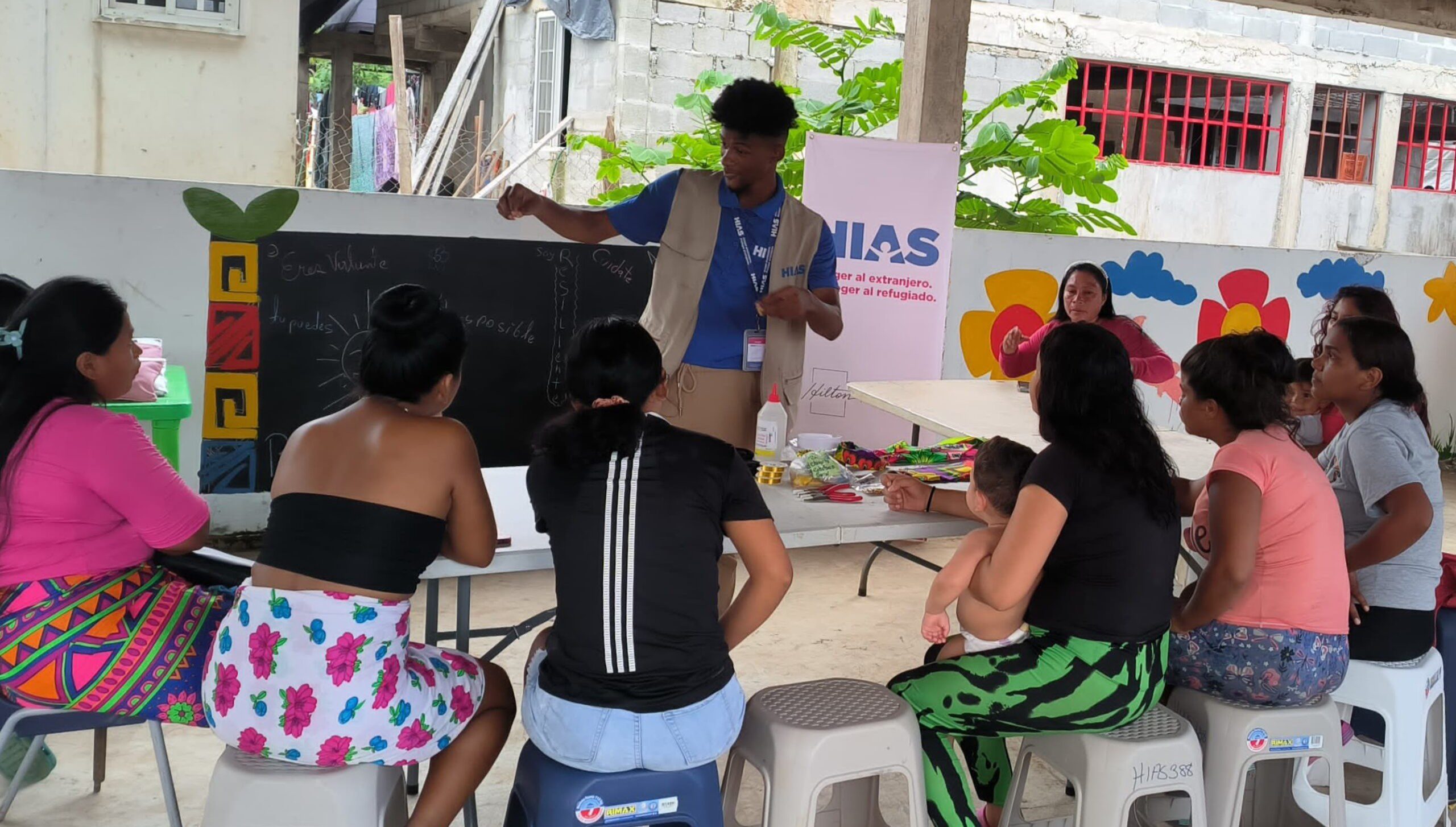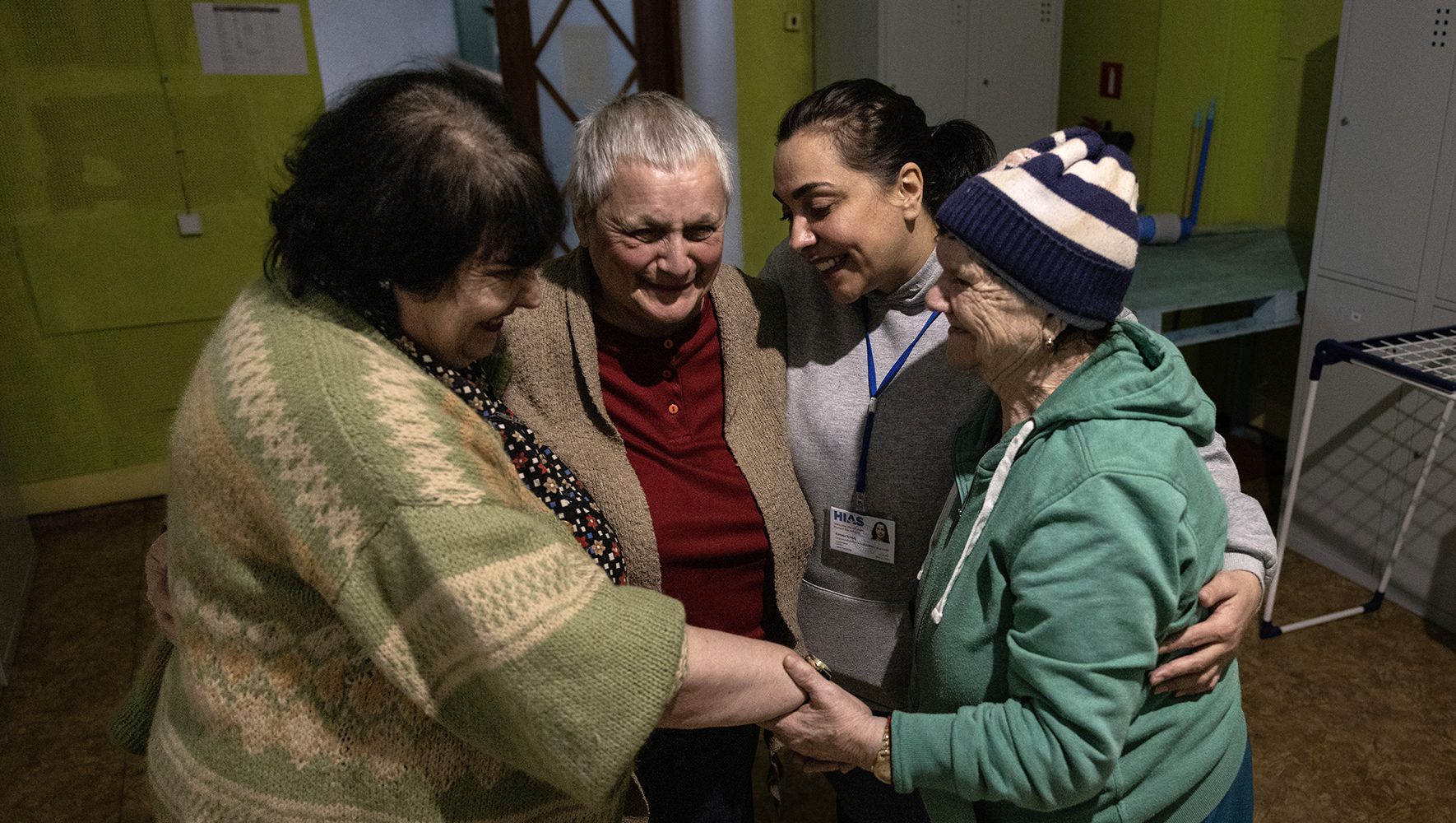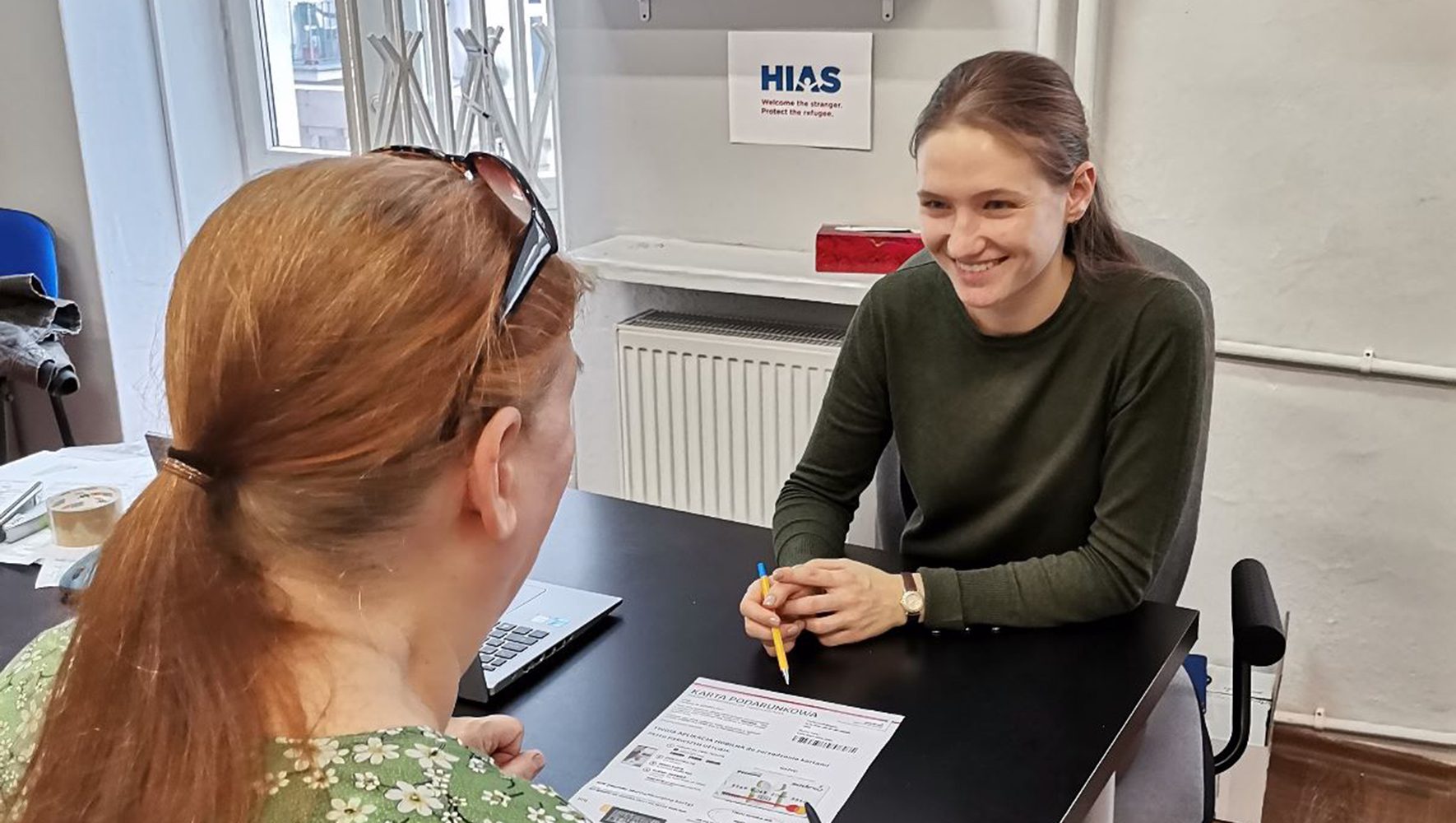Combating “Compassion Fatigue” in Serving Poland’s Refugees
By Jennie van den Boogaard
International Communications Manager
Dec 1, 2023
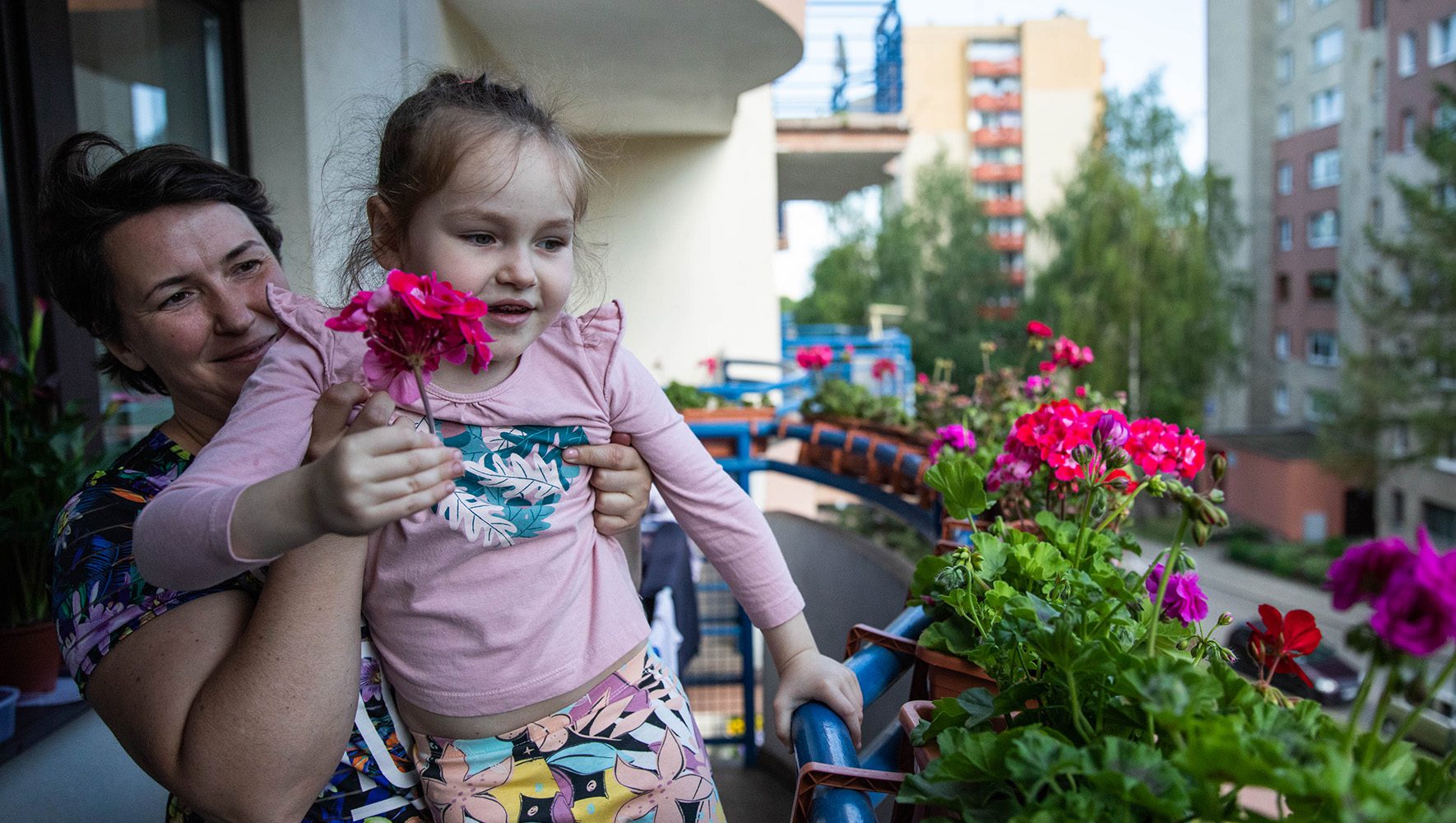
Iryna Zelenytsia and her daughter Anastasiia, whose family is part of the Stowarzyszenie Patchwork network, a HIAS Poland partner, pick flowers outside their apartment on June 1, 2022 in Krakow, Poland. (Betsy Joles for HIAS)
Like many Jews in Poland, HIAS Poland Program Manager Kamila Dabrowska grew up aware of her religion — but not connected to a Jewish community.
“I grew up with the knowledge that there is something called Jewishness, but it was an empty notion in terms of identity.”
In high school, she made fast friends with two other students with Jewish roots, and together, they joined events organized by the Lauder Foundation that brought together young Jewish people. Later, they attended camps, organized youth groups, and helped upkeep Jewish cemeteries, work often supported by the JDC. Gradually, they became part of a Jewish community that reflected their values of social cohesion.
“I think in our case it was more about social relations, a network of people who are alike and discuss what it means to be a Jew,” she says now. “Most of my social circle now has some Jewish roots.”
Dabrowska, who joined HIAS this year, has begun her job at a momentous moment in Poland’s history. In the last 18 months, more than a million refugees fleeing Ukraine’s war have entered the country, sparking an outpouring of support — and, more recently, concern — from the Polish population. The refugee crisis prompted HIAS to re-open an office in Poland in 2022 to provide services to this influx.
Before joining HIAS, Dabrowska created and worked for the POLIN museum in Warsaw, a trailblazing institution that explores 1,000 years of Jewish history in Poland. The museum is located where the Warsaw Jewish community and ghetto once stood before the Nazis razed it to the ground. Dabrowska considers being a part of the team that helped launch the museum in 2014 as “one of the most important journeys” of her life.
In this conversation, she discusses her career path and explores how her Jewish identity influences and shapes her work with refugees.
Related News
Helping Children in Ukraine Understand War and Displacement
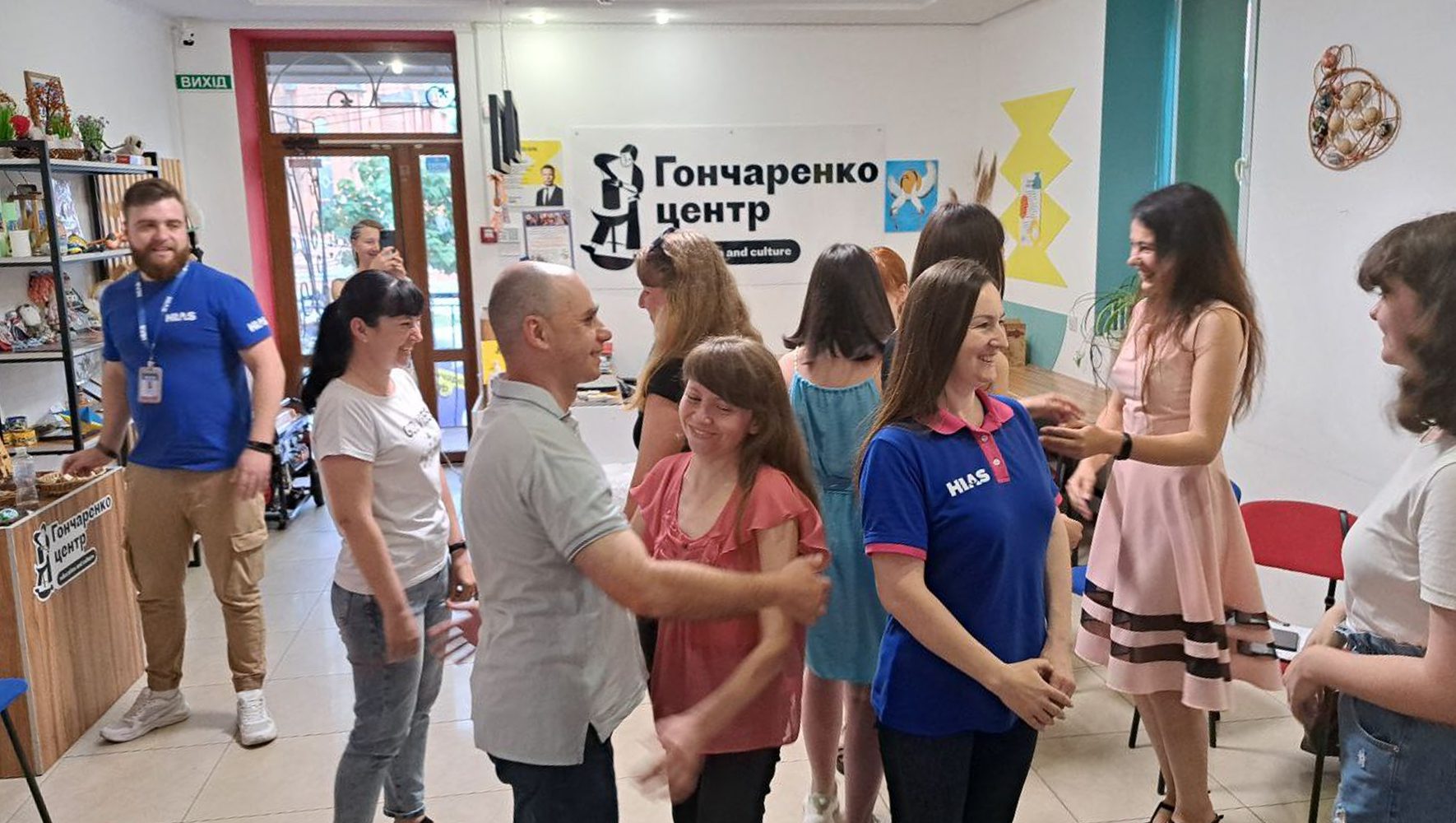
What has the response been like in Poland to Ukrainian refugees?
The situation in Poland is unique because of the large existing migrant Ukrainian community. Before the war, there were an estimated 1 million Ukrainian temporary migrants who came to Poland because of economic reasons. Most of these were men who filled big gaps in the Polish job market, so many of the more recent arrivals were able to tap into existing networks. They knew someone who knew someone. And as it turns out, a lot of Polish people have Ukrainian relatives, too, before contemporary borders were set.
It’s amazing how people can unite to provide a network for Ukrainian refugees with limited structural support from the government. I’m really proud of Poles because they could come together, opening their houses and their hearts.
Now, however, a year and a half after the full-scale war began, there is a certain degree of refugee and compassion fatigue. But it’s also related to another factor. Ukrainian refugees we accepted after the war began were confronted with the same lack of goods and efficient services affecting everyone else. And when you have limited resources, tensions rise. People start to blame refugees. Recent research showed that at the beginning of the war, 95% of Poles declared that Poles should support Ukrainians. Now it’s less than 70%. The number is still high, but there’s been a notable decrease in declared support.
How is the welcome for Ukrainians different than for other refugees?
For the past 10 years or even longer, there has been no discussion about migration policy in Poland. Which migrants should Poland accept? What’s the process? How long can people wait to receive legal status? Who do we regard as refugees, and who do we not? How do we treat economic migrants? There’s no clarity.
In addition to the war with Ukraine, you also have a separate border crisis with Belarus. Ukrainians have these temporary solutions — but then you have a huge group of asylum seekers, refugees, and people in a vacuum crossing over from Belarus who have no rights. There is a lot of ambiguity and inequality embedded in Polish policy, and it shouldn’t be that way.
"I'm really proud of Poles because they could come together, opening their houses and their hearts."
Kamila Dabrowska, Country Director, Poland
Why is it important for people to visit the POLIN museum?
It’s really important that a museum showing 1,000 years of coexistence between Jews and their neighbors had been built in Poland. It shows visitors what happens when one group enters a territory occupied by another. But it’s also a story about how ethnic and national identities are being shaped. How do the identities of two groups living next to each other — but are not a coherent group — clash? The museum shows that history with all those nuances, dating back from the ninth century and continuing to the present day. The story didn’t end after World War Two. It’s still ongoing.
I would say a visit in the POLIN museum should be obligatory to all Poles because it shows a diverse history, but also presents how the interactions in between smaller and bigger groups can be easily manipulated and become a threat.
How does the work of the POLIN museum connect to your work today for HIAS?
For me, the POLIN museum and the story it tells considers what it means to live in a diverse, multiethnic society. What does it mean to have equal rights? Who gives you equal rights, and who denies them? Why does belonging to a different religion or practicing different traditions at home cause you to be treated differently?
When I decided to leave the POLIN museum, I thought that I would still like to work for a Jewish organization as it’s part of my identity and important for me. When the war in Ukraine began, HIAS re-started in Poland, and it gave me a chance to be part of the HIAS team.
For refugees, the same patterns repeat themselves: You end up in a place where you don’t know anything, and you have to rely on networks. Refugees feel neglected and full of fear but have practical concerns to deal with like where to sleep, how to get a job, and how to survive. Going through Jewish refugee experiences, it struck me that no matter who you are or where you’re from, your experience is exactly the same as previous generations of people in your situation.
Because Polish Jews are fortunately not refugees anymore, we have a moral obligation towards those who are refugees now. And because this influx is happening in Poland again, I thought for me it was the right time and place to work for HIAS.
What does it mean to you to be Jewish today in Poland?
It’s my own small personal mission to prove — to be living proof — that there are some Jews left in Poland. We have complex identities and only a few of us of us fit the image of a religious Jew who prays in the synagogue. But there is still a vivid community who is in touch with their roots and want to be Jewish, even though there are a lot of challenges related with that. Not everything has ended. We are still here.


